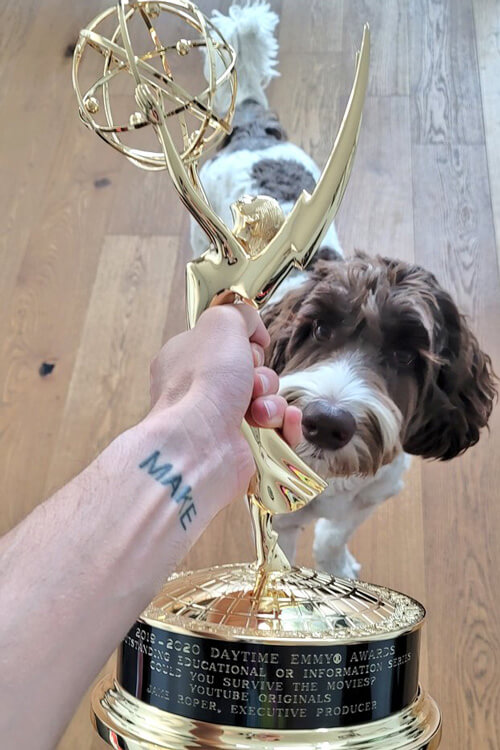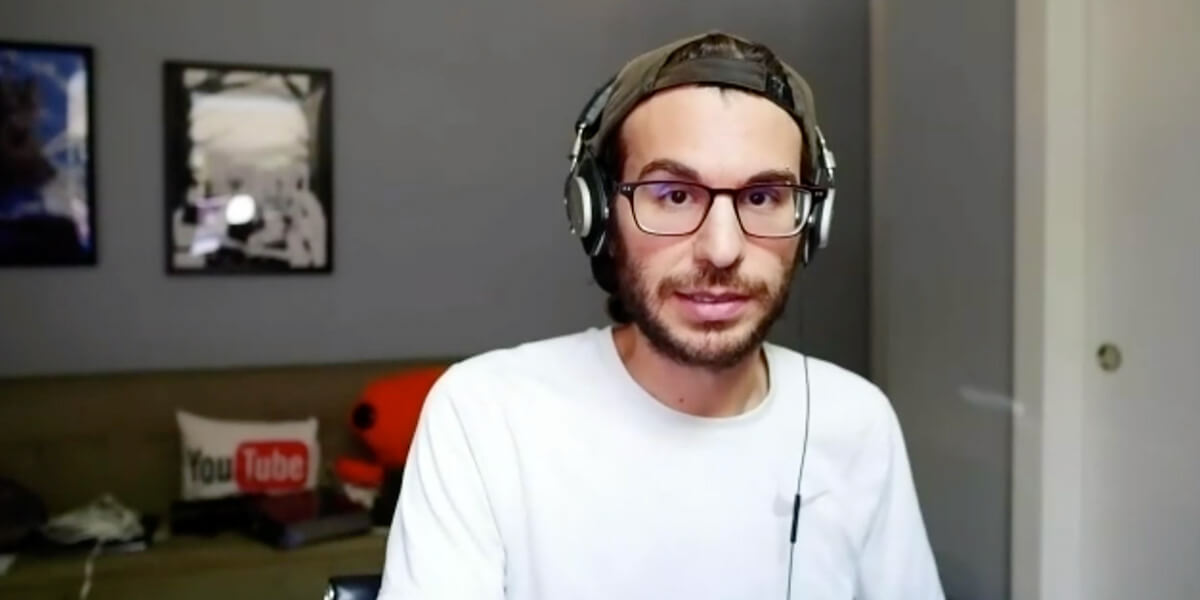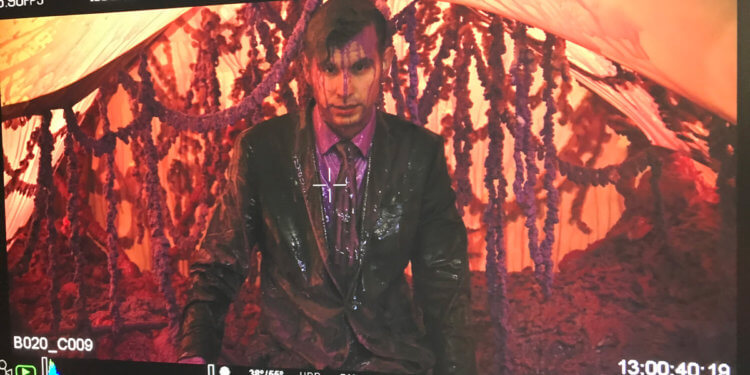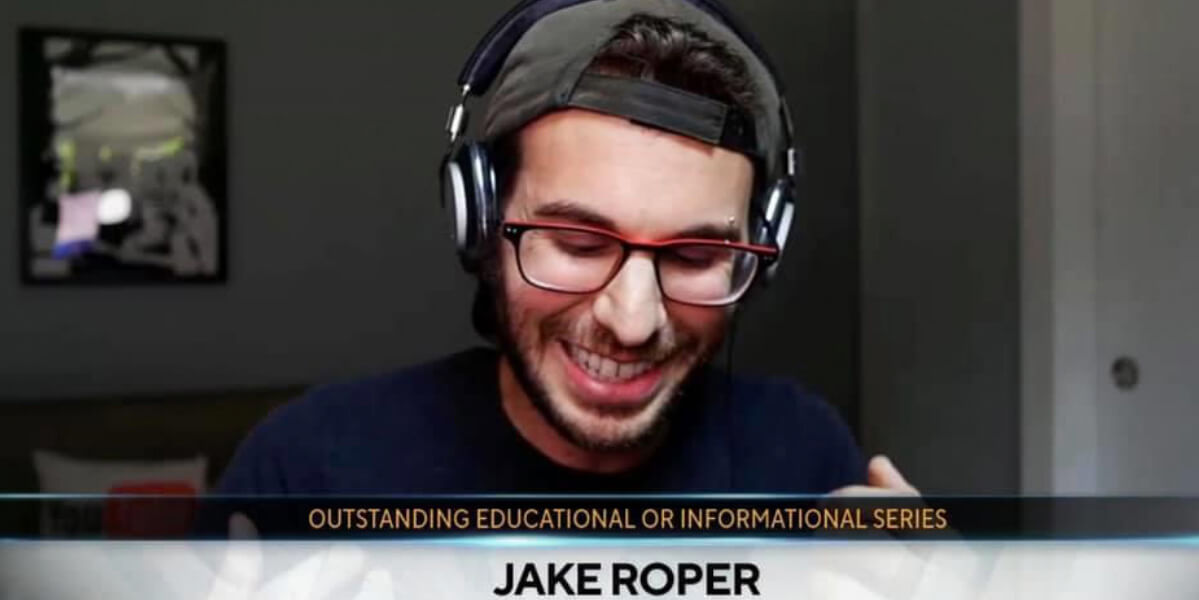
Jake Roper ’05 has been a creative force in the film and entertainment industry since Colorado Academy Upper School. Among his many career highlights are touring with Nine Inch Nails, making a video with the Muppets, and being the host and content creator for VSauce3, a YouTube channel with nearly 4 million subscribers that explores science-based themes.
In July, Jake’s original series on YouTube, called “Could You Survive the Movies?” received a Daytime Emmy award for Outstanding Educational or Informational Series. The series combines Jake’s interests in science education and movie-making, taking audiences behind the scenes to learn about how certain scenes of famous movies like Men in Black, Mad Max, Ghostbusters, and Jumanji are made, and what would happen if we applied actual science to the fictional stories depicted.
Jake’s journey also included a yearlong bout with cancer. I caught up with him over Zoom this summer.
So what did it feel like to win an Emmy?
I feel very lucky, because a lot of things had to happen along the way for me to get to that point. In my original speech, I had a little beat where I wanted to talk about teachers and how important they are. And in it I wanted to say ‘thank you’ to you, Dr. Vogels, and to Mr. Vigil, for always believing in me and for giving me the confidence to be able to express myself in a different medium—film.
Well, how did you get from CA all the way to an Emmy? What in your high school experience at CA set you up for this success?
Depending on the class, I would deliver projects as a video, instead of as a paper or as a presentation, in front of the class. I’ve always loved learning, and yet I might not always be great at expressing my understanding of learning through writing, but I could do it through film.

One thing I remember about you is you were able to make your own opportunities.
At the end of the day, my motivation in life has always been to impress myself, because I am generally very hard on myself. It gives me joy to say, I did it. I told you (meaning me) I could do it!
From CA, you went to the School of Visual Arts in New York, where you eventually graduated. Can you describe how being at an arts school helped you?
Being in school helped me network and meet some really great, talented people. My very first day of college, our production teacher told us ‘only two of you out of the entire program here will actually make it doing what you want to do in film.’ And I knew that I wasn’t the most talented, but I did believe that I could work harder than anybody else.
What was your first breakthrough moment?
Summer break between my freshman and sophomore year at college, I was in Colorado, and I sent my portfolio to some record labels and said I would like to make music videos. And all of them said ‘no’ except for one. They responded and said, ‘We actually have an artist who has a new album coming out, and they are going to be in Denver next week. We can’t pay you anything, but if you want to make a music video we can give you an hour of their time.’
So they came over to my Dad’s house, and we filmed in the basement for an hour. All I had was my little Panasonic DVX, some work lights from Home Depot—[a technique] which I had learned from Angel Vigil—and then a trolley that you use to carry stuff that I used as a dolly. Only had an hour to do it, and it did really well. The label loved it, and it was on MTV.
How did you turn that experience at college into your next opportunity?
I went to work for Pitchfork TV as an intern. I’d spend a week editing an entire concert, and I’d get paid a hundred bucks. In a month I usually made 400 bucks. I was living in a literal closet in Brooklyn. I paid $300 for rent, and I had a hundred dollars for food and everything else. But I still wanted to be in the music business.
From there I transitioned to a television network called Plum TV. There I was the youngest producer/director/editor that they had on staff [at 19]. That was one of the best experiences for me, because I directed an actual TV show. Not only was the show on Plum TV, but it also aired on Bloomberg and Fox Business, and that gave me a great sense of how other networks operate.

What advice would you give to others who are just starting out in the business?
Make yourself indispensable. As much as we’d all like to think we’re unique human beings that can’t be replaced, in the world of business you can be replaced. When I was working for Plum TV, I had to deliver shows to the other networks on Betamax, so I had to convert them from MP4. Nobody knew how to digitize to Betamax besides me! At one point at Plum everyone in the production department got fired except for me, because I was the only one who could deliver a product that other networks were paying for.
What came next?
My next job was in advertising. I shot the entire Levi’s Europe campaign for 2009. Before long I was doing ads for Pampers and Coca-Cola, mainly digital campaigns. And the thing they liked about me is I did everything. ‘He edits it, he shoots it, he color-grades it, he does the sound design, he delivers it to us, isn’t that great?’
Eventually that led to a job at Google, which at the time was just getting into the business of making original content for digital platforms. They, too, needed someone who could “do everything.” In 2011, Google bought YouTube, and Jake was asked to run YouTube’s first original content channel. Still, he was concerned it wouldn’t last.
How did you manage that self-doubt and worry?
I kept thinking, ‘What could I do to make sure they couldn’t get rid of me?’ Eventually they made me the manager of the New York space, which was great, because even if the channel failed, I was safe. From there I became friends with Michael [Stevens] and Kevin [Lieber, the co-founders of VSauce] and just pitched them on my own idea. Because we were part of Google, money was no object. So that became my job—to make content online.
In 2016, Vsauce3 gain independence from Google which allowed Jake even more creative freedom, and VSauce videos really took off.
What advice do you have for people who want to make it in this business?
A lot of people get into [this business] because they want to make money, or they want to become famous. But that’s the wrong attitude. You do it, because if you didn’t, part of you would die. The reason I do it is because I have a lot going on in here [pointing to his head], and the best way for me to get it out is with a camera.
In the midst of a flourishing career, Jake sought medical advice about a lump in his leg. Doctors discovered that it was a cancerous sarcoma. At the age of 28, his life was rocked in ways he never imagined.

You decided to be very public about your cancer diagnosis. Why was that?
I knew it was going to get out eventually, and I wanted to control the narrative.
I think cancer made me a much nicer person. The most important lesson I learned is to be a lot less critical of others and of things that people create. There are still things I don’t like, but I understand why others like it, and I understand the value that it brings.
From having cancer, I learned that we all have a very finite time on this planet. I’d rather just accomplish a lot, than be on my deathbed and think of all the things I should have done.

After returning to VSauce3, you continued to make the fun, educational science videos you were known for, but I’m sure you were looking for a new challenge. How did your show “Could You Survive the Movies?” come about?
I met with Lowe’s Home improvement—of all people—in summer 2016. They wanted to find out a way to work with me, so I suggested that I’ve always wanted to re-create the traps from Home Alone. They loved the idea and built a recreation of Home Alone. I thought there could be something there—it was an idea I wanted to try. I called it, “Could You Survive Home Alone?” And I took that to YouTube, and I said I want to make this into a show. “Could You Survive (insert movie title),” which I pitched to them in 2017. And they liked it enough to greenlight the pilot.
Any final advice for our young artists?
[Because I had some early success], I went through a lot of my early twenties feeling like I deserved things. One thing I learned is that nobody owes you anything, and you don’t deserve anything; you have to work for it. Be kind and thoughtful, and treat everybody as if they are valuable, because they are.
